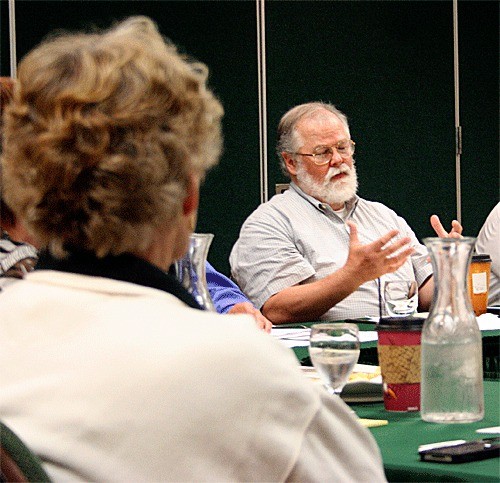Four weeks after voters rejected a $50 million expansion bond, somber leaders of Whidbey General Hospital are starting to plan for the future of the 40-year-old facility.
That fuzzy future entails trying to persuade more voters to sign off on the expansion bond, while starting to discuss possibly merging the publicly owned hospital with some other institution.
Whidbey General Hospital officials are looking at two possible times to bring its bond proposal back to the voters — November 2011 or February 2012.
“I think we owe it to everyone to try it again,” hospital commissioner Ron Wallin said during a leadership retreat held Wednesday at the Best Western Harbor Plaza in Oak Harbor.
“Whether we pursue November or February, we need to get started now,” hospital commissioner Ann Tarrant said. “It needs to pass the next time we decide to run it.”
In May, 55 percent of the voters said “yes,” but the bond needed a 60 percent majority to pass.
The commissioners were hesitant to set a date for the next election. They want to find some more information on which date provides the best chances for success. Besides, decisions cannot be made at a board retreat.
To gather the desired information, the Friends of Whidbey General Hospital — the committee that promoted the recent bond — will try to find someone who could analyze the hospital’s best chance to run the bond.
Having the bond in November would place it on a crowded ballet with political races in Oak Harbor, Coupeville and Langley. A February ballot would likely mean it would stand alone as it did in May.
Tarrant said she would like to have a recommended election date ready in two weeks. The board could make a formal decision during its July meeting.
The bond as proposed in May would have funded construction of a new wing at the hospital campus, featuring 39 single-bed rooms.
The bond failure comes as Whidbey General Hospital finds itself squeezed by competing facilities located north and east of the island. Hospital CEO Tom Tomasino noted significant numbers of people living on North and South Whidbey Island are seeking treatment at Island and Skagit Valley hospitals or Providence Everett Regional Medical Center in Everett.
Despite significant numbers of South Whidbey residents seeking treatment off island, voters on the south end were supportive of the bond. Hospital officials indicated the ferry system was a factor in their support.
With significant numbers of people heading off island for hospital services, Tomasino said people connected to Whidbey General Hospital have to do a better job advocating for the local medical facility.
“There’s a lot of support for the hospital in this community, but it’s silent support,” Tomasino said. “We do not have a presence in this community and we should have. We’re going to have to engage this community if we want to remain independent.”
Hospital leaders have said they are committed to keeping the hospital independent and publicly owned, however they were also open to the possibility of merging with a larger entity in the future.
The hospital officials caused a swell of controversy in the days leading up to the May 17 election, when representatives from Capella Healthcare, a Tennessee for-profit corporation, visited a board meeting with a proposal to acquire Whidbey’s public hospital. Board members rejected the offer.
Tomasino said another corporation, LifePoint Hospitals, has also expressed interest in acquiring the hospital. Most recently, Providence Everett Regional Medical Center recently asked for a copy of Capella’s proposal.
He highlighted during Wednesday’s board retreat the pros and cons of any kind of merger.
“Do we look for some other entity to come in and be our big brother?” Tomasino questioned during the meeting. A merger could provide Whidbey General Hospital with the potential for growth and more financial stability, but a lot of issues concerning the cultures between two groups, organizational structure and control would have to be resolved before any possible merger would be considered.
“The bond won’t change the discussion we need to have,” Tomasino said. The hospital has a thin profit margin and the number of patients in 2011 is down from last year.
Tomasino said he will develop a plan in the coming weeks on how the hospital will react to any future acquisition offers.



